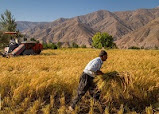The charity World Central Kitchen (WCK) aims to deliver the aid on a temporary jetty, though precise details of how supplies would reach shore have not been made clear.
If the new sea route is successful, it may help to ease the hunger crisis affecting Gaza, where hundreds of thousands of people face malnourishment and hospitals in the worst-stricken northern areas have reported children dying of starvation.
However, aid agencies have repeatedly said that plans to bring in aid by sea and through air drops will not be enough to satisfy the territory's vast needs.
Since October 2023 the Israeli assaults have killed more than 31,000 people and driven nearly the entire 2.3 million population of Gaza from their homes.
The United Nations says all of Gaza's 2.3 million people are suffering from a food crisis and a quarter of them are on the precipice of famine, especially in the north.
Israel, which sealed off all land routes into Gaza apart from two crossings on the territory's southern edge, denies blame for hunger and says aid agencies should do a better job distributing food.
The agencies say they need better access and security, both of which are the responsibility of Israeli forces that have blockaded the strip and stormed its cities.
The distribution of the limited aid that arrives has been chaotic and frequently violent under the watch of Israeli tanks.
In one of the worst reported incidents yet, Gaza health authorities reported at least 21 people had been killed and 150 wounded on Thursday night, blaming Israeli forces for opening fire into a crowd queuing up for food at a road junction near Gaza City.
There are increasing signs of friction between Washington and its close ally Israel over the conduct of the war, which officials in President Joe Biden's administration say is being waged with too little care for Palestinian civilians.
US Senate Majority Leader Chuck Schumer, the highest ranking Jewish official in the United States and a leader of Biden's Democratic Party, called on Thursday for Israelis to hold an election and replace Netanyahu.
He described Netanyahu as an obstacle to peace who was destroying Israel's international standing. "Israel cannot survive if it becomes a pariah," Schumer said.
Netanyahu's Likud Party said his policies had widespread public support. "Senator Schumer is expected to respect Israel's elected government and not undermine it," it said. "This is always true, and even more so in wartime."






